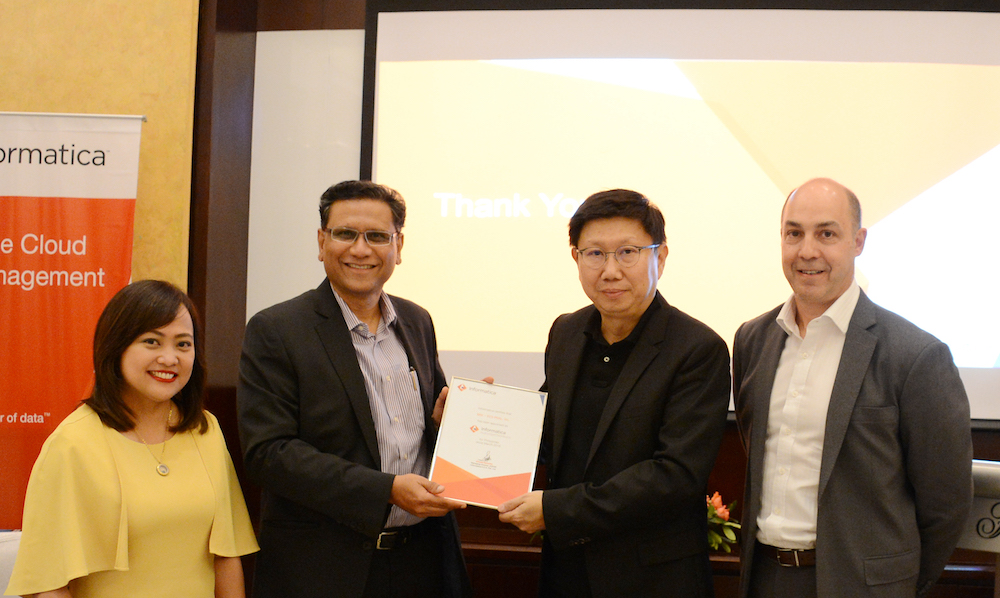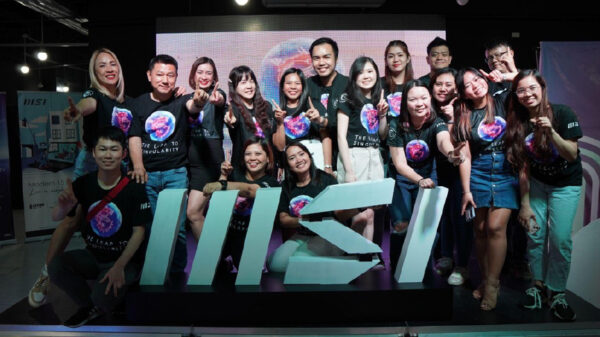The Philippines’ robust economy and “fantastic” infrastructure have led Informatica—the leading provider of enterprise cloud data management solutions—to set up an office in the Philippines, and subsequently appoint MSI-ECS Phils. Inc. as its sole value-added distributor in the country.

In photo (from left:) Mimi de Dios, Country Manager, Informatica Philippines; Sivadas Ramadas, Managing Director, Informatica, ASEAN; Jimmy D.Go, president and CEO, MSI-ECS Phils., Inc.; Franco Flore, Alliance Sales Director, Informatica, ASEAN
“Philippines in general is a big market for us. We are in the Philippines because the economy is robust. The economic growth is in the high numbers—5% to 6%—not many economies can achieve that kind of growth. And the infrastructure is fantastic,” said Sivadas Ramadas, Informatica’s Managing Director for the ASEAN region, in an exclusive interview with UpgradeMag.com.
Although the company just recently put up an office in the country, it already has a local customer base, according to Ramadas. Some of these companies include Philippine Airlines, Land Bank, China Bank, and Globe Telecom.
“We’ve been addressing the opportunities in the Philippines for many years but we’ve doing it out of Singapore and through partners since we are a partner-centric business. Most recently, we set up an office here and appointed Mimi De Dios as the country manager.”
Since Informatica doesn’t engage directly with customers, the Philippine office will work with six value-added resellers of MSI-ECS to grow its customer base and revenues. The six VARS are Indra Phils., Inc., Solvento Phils., Inc., Net Global Solutions, Inc., SMS Global Technologies, Inc., Nexus Technologies, Inc., and Exist Software.
“Partners are the key players to our success,” said Franco Flore, Informatica’s Alliance Sales Director for APJ (Asia Pacific Japan). “MSI-ECS is going to be a key player for us in terms of building our business across the Philippines because our business here is 100% channel. We chose MSI-ECS because of its credibility and is one of the very largest [distributors] in the Philippines ”
Flore explained that previously Informatica’s business was very much referral-based and relied on consulting partners, such as Nexus Technologies, to win customers. “We didn’t have a robust program where we could actually grow our business. We are a US$1-billion organization right now, and we won’t be able to grow to a US$3 to 5-billion company by just putting people on the ground. We have to expand via the channels.”
Thus, in 2016, the company launched a two-tier distribution model that would give the company instant coverage in the market, “because at the end of the day, they [the distributors] have the know-how, they have the resellers, and the infrastructure. They have the consulting partners and can help us scale very quickly. The VARs are our arms and legs,” said Flore.
To provide a wealth of resources to new and existing partners, Informatica has the Partner Activity & Resource Center (PARC), a portal that offers business partners access to training, sales, and marketing assets; opportunity management; and other exclusive partner content.
The next phase in the Philippines is to appoint consulting partners or train the existing VARs to become consulting partners to do the actual implementation of Informatica’s solutions.
“The good thing about the Philippine partners is they have a symbiotic relationship. They all know each other and work very well with each other. They are very enthusiastic,” said Ramadas.
Building the data foundation for digital transformation
Informatica delivers what it calls enterprise cloud data management, which means it provides data management products and services for companies in six areas: data integration, data quality, master data management, big data management, cloud data management, and data security.
“We help our customers build the data [foundation] for digital transformation,” said Ramadas. To help companies get started, Informatica will first help companies get data together from multiple sources, such as social media and Internet of Things, into a common data repository that they can then use for data analysis and reporting and to support processes.
“It’s not only important to get the data into your systems; you also need to make sure your data is clean, so we offer data quality products,” said Ramadas.
The next set of problems related to data is how to make sense of the data—putting the data into a format so companies can have a 360-degree view of the data. And finally, to keep data secure, Informatica offers security at the data layer. “We are not in the area of firewalls,” said Ramadas. “We bring the security to the data level.”
With regards to the industries that Informatica is targeting, Ramadas said the company essentially pursues all businesses that are data and analytics-driven. In the Philippines, the early adopters tend to be in the telecommunications, finance, and insurance sectors because of the volume and velocity of data they handle.
“Informatica has been in the business for many years, and we primarily focus on data—we provide the solution for managing the data and we complement a lot of the other big players such as SAP and Oracle. The market opportunity for us and our partners is huge,” concludes Ramadas.




















































































































